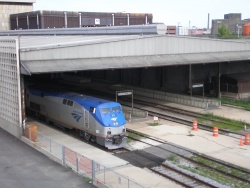No Train to Madison for CNU 19
The Congress for the New Urbanism (CNU) is holding their annual congress in Madison from June 1-4. The prominent group of planners and architects has kept “congress” as the name of their annual meeting instead of changing it to “conference”, as most organization do, for a specific reason: the open discussion of topics related to urbanism. It is through this culture of the open discussion of ideas that the group has been able to evolve and keep the New Urbanism, well “new”. On the program are a variety of local, national and international topics that are being covered in plenary and/or breakout sessions during the event that we are going to touch on over the course of the next week leading up to CNU 19 in Madison. The one that could prove the most exciting is Saturday night’s event that features an intellectual “discussion” between the leaders of the two most prominent movements in contemporary planning and architecture, Andres Duany of the New Urbanism and Charles Waldheim of Landscape (Ecological) Urbanism.
The congress this year has taken on the theme of “Growing Local” signifying the timely subject of balancing agriculture and urbanism that Milwaukee, Madison and the State of Wisconsin are currently engaged in. However, there are several other major topics areas like Biking, Retrofitting Suburbia, LEED for Neighborhood Design, Transportation and Transit Oriented Development (TOD) that have multiple events planned around their discussion. The sessions designed to educate newcomers about the traditional town planning principles that New Urbanism is based on are also always part of the congress.
Transportation
The last year has seen numerous setbacks for public transportation in the State of Wisconsin. As the congress approaches one cannot help but wonder if we have hit the low point of popular support for public transit in Wisconsin or if we have further to go. Property values around transit hubs are falling and dragging city property values with them. The truth is that intelligent investors don’t invest in people who don’t invest in themselves and, unfortunately, we are finding out that this old saying can be applied to individuals, as well as cities. The lack of confidence shown by not developing critical 21st century transportation infrastructure will hurt Wisconsin for many years to come, but there is still hope for quality public transportation in Wisconsin’s cities.
The opportunity of Transit Oriented Development to create densely populated, walkable neighborhoods and districts will be explored in a session called “Typology of Transit Oriented Development” that will take place on Saturday. Interesting examples of how the principles of TOD are applied to local conditions and culture in order to create authentic places will be part of the panel presentations and discussion.
Recent public transportation policy in Wisconsin has been dominated by short-sightedness and focused on a single mode of transportation. Participating in a forum where people have an opportunity to organize around common ideas and principles can help to change the discussion and policy toward public transportation. After all, transportation efficiency is one of the many assets that make cities the most productive places to live.
Guest Post by: Dr. Matthew Trussoni
Dr. Matthew Trussoni, AIA, PE is an Assistant Professor at the Milwaukee School of Engineering


















“Property values around transit hubs are falling and dragging city property values with them”
What? Since when?
@Fabal D’louieu There was just an article about the Milwaukee Intermodal station’s TIF being in a bit of trouble. But Matt can expand on his point…
@ Fabal,
Yes Dave is correct, this is the article from JS Online:
http://www.jsonline.com/news/milwaukee/122372329.html
Thanks. Dang, that stinks… It seemed like you were generalizing about TOD. I’d say the evidence at hand suggests transit is generally very good for property values – provided the governor at hand doesn’t screw it up 🙂
@Fabal I’d add, and again Matt can correct me if I’m wrong, that his point was when we turned down the HSR funds, and are in the process of shutting down the KRM effort it is sending a signal that “we” don’t believe in transit and this is hurting the value of the Intermodal station.
Yeah, that makes sense. Though I would think those areas are still ripe for long term thinking. Even with only a train to Chicago, the convenience of being there for a company with frequent needs in Chicago would be pretty high. But yes, it’s a real pity.
Looking for a contrast, here it is… a pragmatic Republican who gets transportation in Michigan.
http://www.infrastructurist.com/2011/05/26/report-wisconsin-gov-scott-walker-to-spend-up-to-2-billion-on-new-roads/
My mistake here is the pragmatic governor…
http://dc.streetsblog.org/2011/05/26/with-help-from-a-republican-governor-michigan-moves-toward-livability/